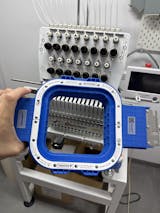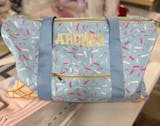1. Introduction to Happy 1201 Embroidery Machine
The Happy 1201 has earned its place in commercial embroidery for robust performance and versatility. Built for small shops and industrial environments alike, this happy embroidery machine blends precision with power through a 12-needle setup and impressive speed.
This guide focuses on what buyers and operators ask most: technical specs, commercial value, durability, maintenance, and accessory optimization. Whether youre scaling production or launching a shop, the Happy 1201 is engineered to elevate results.
Table of Contents
- 1. Introduction to Happy 1201 Embroidery Machine
- 2. Technical Specifications & Industrial Features
- 3. Commercial Viability & Investment Analysis
- 4. Durability Verification & Competitor Comparison
- 5. Advanced Operation & Maintenance Guide
- 6. Accessory Optimization Strategies
- 7. Conclusion: Is Happy 1201 Right for Your Business?
- 8. FAQ: Happy 1201 Machine Essentials
2. Technical Specifications & Industrial Features
2.1 Core Performance Metrics
Purpose-built for high-demand workflows, the Happy 1201 lineincluding models such as the HCS3-1201 Voyager and HCS 1201-30is a happy japan embroidery machine platform designed for consistent commercial output.
- Sewing speed: 1,000 stitches per minute (flat goods) and 850 SPM on cap frames.
- Embroidery area: HCS3-1201 Voyager at 11.4" x 11.2"; HCS 1201-30 at 12.6" x 12.6".
- 12-needle configuration with individual pressure feet for accurate tension control and multicolor efficiency.
| Model | Embroidery Area | Max Speed (Flat) | Max Speed (Caps) |
|---|---|---|---|
| HCS3-1201 Voyager | 11.4" x 11.2" | 1,000 SPM | 850 SPM |
| HCS 1201-30 | 12.6" x 12.6" | 1,000 SPM | 850 SPM |
A heavy-duty drive system, oversized motor, and reinforced components support long, high-speed runs. Paired with a large memory capacity of up to 100 million stitches or 3,000 designs, it keeps pace with demanding queues and integrates smoothly with accessories such as a magnetic embroidery hoop.
2.2 Unique Capabilities: Cap Embroidery & Laser Precision
The Happy 1201 excels at cap work, stitching as close as 10mm from the brim thanks to an ultra-slim sewing arm. A built-in laser crosshair alignment system enables fast, precise placementespecially effective with cap frames and happy japan hoops.
In real-world use (as seen across video testimonials), operators showcase reliable performance across varied substrates and designs, highlighting how technology and craftsmanship come together.
3. Commercial Viability & Investment Analysis
3.1 Pricing Breakdown & Warranty Advantages
Positioned for value, the Happy 1201 is listed at $8,995 to $13,995. A 10-year limited warranty underpins the investment: two years on mechanical parts, three on electronic components, and ten on drive belts and motors. High-capacity memory (up to 100 million stitches/3,000 designs) and USB/LAN connectivity minimize downtime and support remote management. An accessory ecosystemincluding happy embroidery machine hoopsfurther strengthens day-to-day productivity.
3.2 Production Capacity & Multi-Head Efficiency
Large memory and LAN connectivity streamline high-volume workflows, enabling efficient design transfers and consistent throughput. Operator reports underscore steady performance on both small and large orders, reinforcing the platforms versatility and reliability.
4. Durability Verification & Competitor Comparison
4.1 20-Year Reliability Data & Maintenance Protocols
A long track record supports the Happy 1201s reputation for longevity, with reinforced drive shafts, bearings, and servo-driven systems designed to reduce wear. Users report that Happy machines can last up to 27 times longer than some competitors. For best results, follow a structured maintenance schedule:
- Lubricate the rotary hook every 125,000 stitches.
- Lubricate the main bearing every 1,000,000 stitches.
- Replace needles every 810 hours.
- Check bobbins every 30,00060,000 stitches.
- Seek annual professional service for alignment, tension, and bearing checks.
4.2 Performance Against Industrial Rivals
At 1,000 SPM (tubular) and 850 SPM (caps), the Happy 1201 holds pace with many industrial multi-head setups. Some competitors may offer larger fields or higher peak speeds (e.g., 1,2001,500 SPM), but a balanced mix of affordability, commercial-grade output, and extended warranty coverage makes the Happy 1201 compelling for cost-conscious operations.
5. Advanced Operation & Maintenance Guide
5.1 Optimizing USB/Wi-Fi Connectivity
Integrate via HappyLINK software by connecting the machine to a PC over USB, then using the control menu to read designs from the PC or memory media. Keep firmware current for compatibility. For remote transfers, connect through LAN or use a Wi-Fi dongle to join the network and enable easy pattern updates.
5.2 Preventative Maintenance Routines
Daily: add a drop of white sewing machine oil to the rotary hook race and inspect the thread path. Weekly: lubricate the needle bar and verify thread tension. To reduce hoop strikes and fabric damage, many operators use Sewtalent magnetic hoops; consider magnetic hoops for happy embroidery machine to help maintain even tension and minimize hoop burn.
6. Accessory Optimization Strategies
6.1 Maximizing 320x320mm Hoop Compatibility
Compatible third-party magnetic hoopsincluding Sewtalent options with N50 magnets and PPSU durabilityhelp fully utilize the 320x320mm (12.6" x 12.6") field on models like the HCS 1201-30. Explore happy embroidery frames to match sizes and applications while maintaining proper fit.
6.2 Specialty Attachments for Niche Applications
Sock frames enable paired embroidery, shoe clamps stabilize footwear, and side clamp systems handle bags, leather, or thicker materials. These attachments expand the machines range for niche jobs without compromising quality.
7. Conclusion: Is Happy 1201 Right for Your Business?
With 12 needles, up to 1,000 SPM, laser-guided placement, and a 10-year limited warranty, the Happy 1201 delivers a strong mix of speed, quality, and protection. Startups benefit from compact, multicolor efficiency; larger teams gain scalability and smooth integration. If youre evaluating a commercial embroidery machine for sale, the Happy 1201 offers a pragmatic balance of performance, reliability, and value.
8. FAQ: Happy 1201 Machine Essentials
8.1 Q: What is the maximum fabric thickness the Happy 1201 can handle?
A: The machine is designed for a wide range of fabric thicknesses, from delicate silks to thicker materials like denim and canvas, aided by its robust build and adjustable settings.
8.2 Q: Is the Happy 1201 compatible with modern embroidery software?
A: Yes. It supports common formats such as DST and integrates easily via USB or LAN for design transfers and updates.
8.3 Q: How do I troubleshoot calibration errors on the Happy 1201?
A: Use the built-in diagnostics and recalibration tools, confirm a stable setup, inspect the thread path for obstructions, and follow the digital manual. Regular maintenance and professional servicing help prevent issues.




